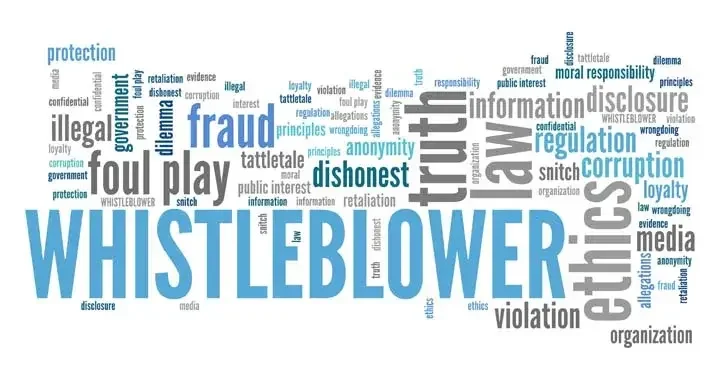Violating the law in your business activities—including laws that protect whistleblowers—can be costly and damaging for your company's reputation. Having a whistleblower protection policy in place can help to prevent problems from getting out of control, and also create a good reputation for your company with its employees.

Defining a whistleblower
A whistleblower is an employee who reports some type of wrongdoing in connection with the employer's organization. The whistleblower can be the employee who makes the original report, as well as one who assists with the resulting investigation. A report may be made within the company, or to a government agency.
The wrongdoing can be by the employer or any of its employees or owners, or by someone doing business with the company. It can relate to numerous illegal or unethical matters, involving such things as accounting practices, taxation, securities regulation, fraud, environmental protection violations, sexual harassment in the workplace, or hiring practices.
Whistleblowers and the law
The most well-known law on this subject is the Whistleblower Protection Act of 1989, which protects federal government workers who report illegal or dangerous activities related to government agencies. Whistleblower protection is also afforded under various federal laws governing securities and relating to environmental protection. There are numerous laws with whistleblower protection provisions that are enforced by the Occupational Safety and Health Administration (OSHA). Most states also have whistleblower laws, and their details vary greatly.
A company can't prevent employees from reporting violations to government agencies. However, having a whistleblower protection policy can encourage employees to report suspected violations within the company first, providing an opportunity for the company to resolve the problem without involving outside parties.
Advantages of a whistleblower protection policy
Having a whistleblower protection policy in place has numerous advantages for your company. In addition to promoting compliance with state and federal law, having such a policy can:
- Encourage employees to bring problems to the attention of management, rather than going to a government agency or to the news media. While an employee can't be prohibited from going outside of the company with a complaint, knowing that the company takes complaints seriously—and affords whistleblower protection—may help make an employee feel more comfortable in bringing a problem to someone internally first.
- Give company management an opportunity to become aware of potential problems quickly, and resolve them early. A policy that includes a procedure for anonymous reporting can increase the likelihood of early reporting.
- Give employees a positive view of their employer, by knowing that they can come forward with possible problems, in private, and without fear of retaliation.
- Go beyond activities that violate state or federal law, by also encouraging employees to report violations of company policy, or other situations that may actually end up benefiting the business.
Once the whistleblower protection policy is developed, all employees need to be made aware of it. An explanation of the policy also should be part of any onboarding process for newly hired employees.
Whistleblower protections
Under the whistleblower protection laws, and company whistleblower protection policies, the employee is protected against retaliation for making a report. Retaliation typically refers to actions by the employer that negatively affect the employee, such as firing, demotion, pay reduction, work hour reduction, or job reassignment. The whistleblower also should be able to make a confidential report, although it may ultimately be impossible to keep the report private as an investigation is conducted.
The whistleblower is protected for reporting suspected problems in good faith, even if the suspicion turns out to be wrong. Of course, the whistleblower is not immune from consequences if the investigation reveals illegal actions on the part of the whistleblower, and is not immune for knowingly making a false report.
A whistleblower protection policy should inform employees as to how to go about filing a report, such as to report the problem to their immediate supervisor, or to a particular person in the human resources department.
Handling whistleblower reports
A whistleblower protection policy needs to be taken seriously by company management. When a report is received, the employer should:
- Conduct a serious and complete investigation of the complaint.
- Conduct the investigation in a manner that affords the reporting employee, and any other employees who may be involved in the investigation, with the most confidentiality possible.
- Keep the reporting employee informed of the progress of the investigation, and the results.
- Keep records of the complaint, details of the investigation, and the results.
- Make sure that the whistleblower is told what action to take in the event he or she believes any act of retaliation takes place.
- Use caution when disciplining a whistleblower for conduct unrelated to the whistleblower complaint.
Developing a good whistleblower protection policy can help ensure that your company can address potential problems early and maintain compliance with the law. It also can foster good relations with employees, and even with customers and the general public.

